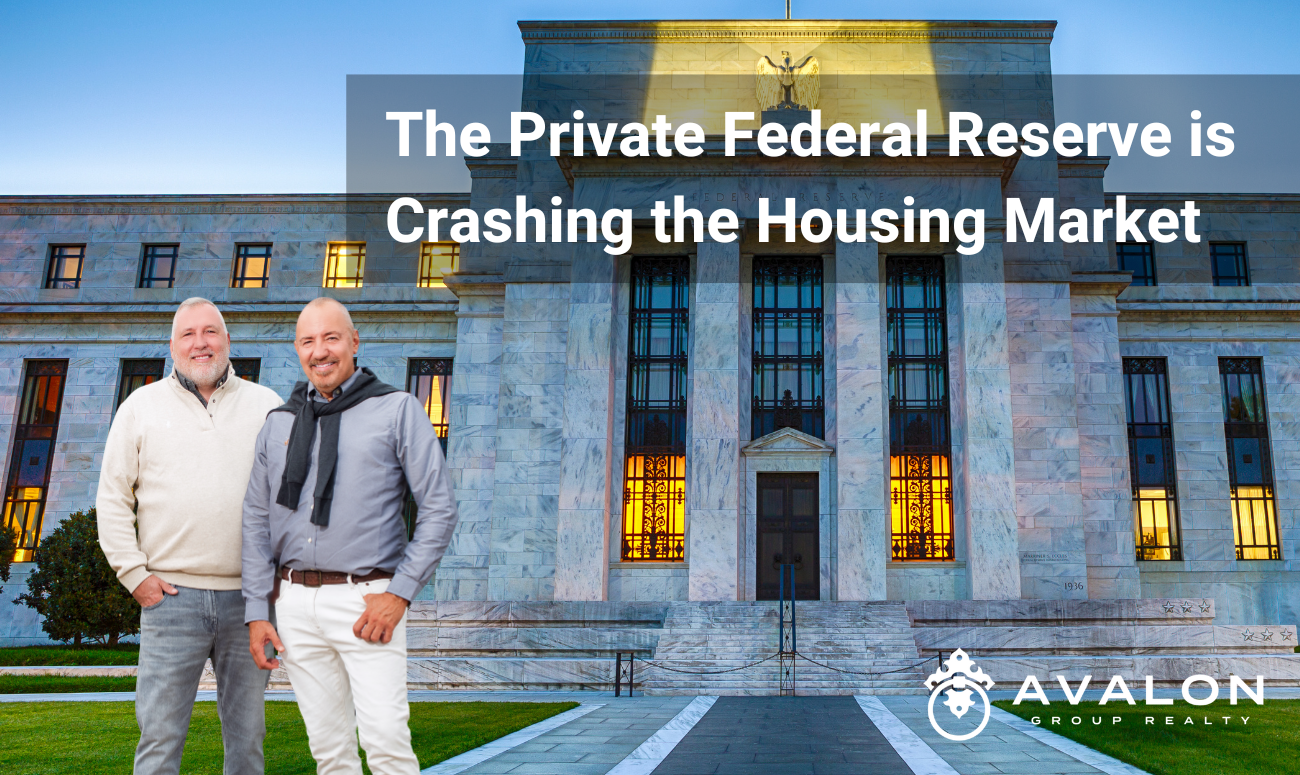The Private Federal Reserve is Crashing the Housing Market
The St Petersburg real estate market is experiencing dramatic shifts—and not for the better. The source of the turbulence? A powerful, private institution with outsized influence: The Federal Reserve. Or as I like to call it: The Private Federal Reserve is Crashing the Housing Market. But don’t worry—this isn’t a doom-and-gloom piece. At Avalon Group Realty, we believe in staying informed, being resilient, and making smart, timely decisions.
Let’s unpack what’s really going on and how you, as a homeowner, seller, or buyer, can still thrive in today’s real estate environment.
Understanding the Federal Reserve's Role in Housing
What Does the Fed Have to Do with Real Estate?
The Federal Reserve controls the federal funds rate, which influences everything from credit card APRs to the all-important 30-year mortgage rate. When the Fed raises its interest rates, mortgage rates climb. When they pause or lower, housing becomes more affordable. It sounds simple, right? But the consequences are huge.
According to Mohamed El-Erian, Chief Economic Advisor at Allianz, "There's a real issue as to whether we've broken the housing market." We agree—and so does the Director of the Federal Housing Finance Agency (FHFA), William J. Pulte.
Pulte's Blunt Message
In a strongly worded statement on X, Pulte demanded action from Federal Reserve Chair Jerome Powell, stating, “Jay Powell needs to lower interest rates—enough is enough.” He points to the damage current policies are causing across the market. Mortgage rates have climbed to an average of 6.86%, with 30-year fixed rates at a 23-year high of 7.48%.
That’s not sustainable for average Americans. Which is why The Private Federal Reserve is Crashing the Housing Market has become more than just a phrase—it’s a reality.
Pulte, a seasoned investor and homebuilding veteran, is not just speaking from opinion—he’s a Trump-appointed director overseeing Fannie Mae, Freddie Mac, and the Federal Home Loan Banks. As the grandson of the founder of PulteGroup, he knows how interest rate shifts impact everything from new construction to long-term affordability.
He founded Pulte Capital Partners in 2011, focusing on investment in homebuilding and housing products. His deep expertise gives weight to his urgent call for interest rate relief.
How the Federal Reserve Started the Crash in 2023
The seeds of today's housing crisis were planted in early 2023, when the Federal Reserve began one of the most aggressive rate-hiking cycles in modern U.S. history. Their goal? Tame inflation that had skyrocketed during the post-COVID economic recovery. But their solution came at a steep cost.
From March 2022 through 2023, the Fed raised rates by a staggering 525 basis points. The federal funds rate rose from near-zero levels to over 5%, driving mortgage rates to heights unseen in over two decades.
This rapid rise in rates sent shockwaves through the housing sector. Builders halted projects due to financing costs. Buyers faced monthly mortgage payments hundreds of dollars higher than just a year before. And existing homeowners—those lucky enough to have secured ultra-low pandemic-era rates—stayed put. Who would trade a 2.5% mortgage for one nearly triple that?
Nora Sturgill, a seasoned agent with Avalon Group, explains, “People weren’t just priced out—they were psychologically stunned. There was confusion and fear. And that paralyzed the market.”
Meanwhile, inflation—which had already started to cool by mid-2023—kept declining. Many questioned whether the Fed had overcorrected. “It felt like we were watching the brakes being slammed on an already slowing vehicle,” Nora added.
The irony, according to economist Mohamed El-Erian, was that the Fed didn’t just curb demand—it crushed supply. By pushing rates so high, they discouraged homeowners from selling and new buyers from entering. “They’ve broken the market’s rhythm,” he said.
This is how The Private Federal Reserve is Crashing the Housing Market began—not in 2025, but back in 2023. We’re now feeling the ripple effects: constrained inventory, elevated prices despite weak demand, and an uncertain path forward.
The Domino Effect on Buyers and Sellers
Frozen in Place
The housing market is experiencing what economists call a "frozen" market. Sellers aren’t listing homes because they don’t want to give up their 2-3% mortgage rates. Buyers are priced out due to high interest rates. According to Redfin, there are 500,000 more homebuyers than there are available homes. That’s not just a supply issue—it’s a policy failure.
Impact on St Petersburg Real Estate Market
Pam Amante, a St Petersburg real estate agent with Avalon Group, puts it bluntly: “We’re seeing hesitation from both sides. Sellers feel trapped by their low-rate mortgages. Buyers are struggling to afford the monthly payments at today’s inflated rates.”
But Pam remains optimistic: “In this environment, informed strategy makes all the difference. It’s not the time to panic—it’s the time to plan.”
How the 10-Year Treasury Ties In
Mortgage rates are directly affected by the 10-year Treasury yield, which currently sits around 4.32%, a marked increase from early 2023. If projections are correct, that number could hit 5.5% by year’s end if inflation and trade policy aren’t addressed.
Many U.S. homeowners are clinging to old low-rate mortgages. This has kept prices artificially high while deterring listings—slamming both supply and demand simultaneously. As El-Erian put it, “That is the way you destroy the housing market.”
Why the Market Isn’t Doomed
Florida Resilience and Migration Trends
Despite national headlines, the St Petersburg real estate market remains a beacon of opportunity. Florida continues to attract buyers due to our weather, tax benefits, and lifestyle. This influx helps stabilize the market even during high-rate environments.
Aaron Hunt, Broker of Avalon Group Realty, says: “We’re seeing consistent interest from buyers relocating from New York, California, and even Texas. St. Pete’s lifestyle is irresistible, and smart buyers know that timing the market is less important than time in the market.”
Real Demand Never Went Away
Although interest rates are high, demand hasn’t disappeared—it’s just waiting in the wings. Yvette Kim, a seasoned St Petersburg real estate agent, says, “We have hundreds of buyers pre-approved and ready to act the minute rates drop. The moment the Fed relents, we expect a surge.”
The key is staying engaged and prepared.
How to Navigate a Market the Fed Complicates
Tips for Buyers
Lock in rates now before potential hikes later this year
Look for seller concessions like closing costs or rate buy-downs
Focus on long-term value, not short-term rate swings
Tips for Sellers
Price realistically—buyers are rate sensitive
Highlight low tax rates, energy efficiency, and location perks
Work with a St Petersburg real estate agent who understands the nuances of this market
Nora Sturgill of Avalon Group adds, “This is a great time for homeowners to reposition their equity. While rates are high, values remain strong in the right neighborhoods.”
Why We Still Love St. Petersburg
A Great Place to Call Home
High rates or not, St. Pete is booming. From its arts scene to award-winning beaches, the city offers a lifestyle few others can match. That’s why Nora, Pam, Yvette, and I are passionate about helping people call it home.
What Sets Us Apart
Tax-friendly living
High quality of life
Excellent walkability and culture
Strong community and local support
Yvette Kim, St Petersburg real estate agent with Avalon Group, says, “The Fed can hike rates all it wants—but it can’t take away the charm and strength of our community. People still want to move here. That’s powerful.”
FAQ: Federal Reserve & Housing Market
Is the Federal Reserve a government agency?
No. The Fed is an independent central bank with private components. While it serves the public interest, it operates independently of elected officials.
Why are mortgage rates so high?
Mortgage rates are influenced by the Fed Funds Rate and 10-year Treasury yields. Current high rates are a direct result of aggressive Fed policies aimed at curbing inflation.
Will rates go down soon?
Experts like Pulte are urging cuts by June or July 2025. However, nothing is guaranteed. That’s why buyers should act based on current conditions, not hopes.
How can I protect my real estate investments?
Work with trusted professionals, like the Avalon Group Realty team. We offer real-time market guidance, negotiation strategy, and local expertise that turns uncertainty into opportunity.
Bullet Recap
The Fed’s rate hikes have driven mortgage rates to 23-year highs
Sellers aren’t listing; buyers are priced out
Inventory is historically low—by over 500,000 homes
Florida remains a top destination, offering unique real estate stability
Experts like Pulte and El-Erian warn the Fed is doing long-term damage
Avalon Group offers strategies to win despite the noise
Final Thoughts: Stay Calm, Stay Smart
Let’s say it one more time: The Private Federal Reserve is Crashing the Housing Market. But that doesn’t mean you can’t still win.
We believe in educating our clients. We believe in strategy. And most of all, we believe in St. Pete. Whether you’re upsizing, downsizing, investing, or buying your first home, we’re here to guide you every step of the way.
The Private Federal Reserve is Crashing the Housing Market—but you don’t have to crash with it.
Reach out today and let’s navigate the future together.
The Private Federal Reserve is Crashing the Housing Market may be the headline, but our story in St. Pete is still being written—with sunshine, strength, and smarter moves.
Visit: www.AvalonGroupTampaBay.com
Contact Aaron Hunt directly to start your real estate success story:
Phone: 727-262-7920
Follow us for more Tampa Bay real estate tips, market updates, and insider information:
👥 Join Our Community:



